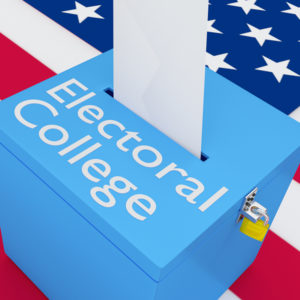While the Electoral College vote this month was seen by political observers as President Trump’s last long shot at challenging the election result, there is perhaps one more to come.
Over the past several days, the flurry of activity from inside the While House hasn’t been the rustle of packing tape and bubble wrap but rather a series of meetings between President Trump and key groups of legal and legislative advisors. The topic being discussed has been whether to mount a formal challenge to the Electoral College vote in states where they allege fraud and other election irregularities.
This would not be the first time votes of the Electoral College were challenged.
In counting the Electoral College votes from the 2004 election, there was a challenge to Ohio’s 20 votes. The votes were soon upheld, as both the House and the Senate failed to agree to invalidate the votes, thereby retaining them as planned for President Bush.
Other historical challenges have been initiated by the states themselves.
Two separate slates of “dueling electors” were set forth by South Carolina, Louisiana and Florida in 1876. This prompted Congress to pass the Electoral Count Act a decade later.
And in 2000, the GOP-controlled Florida legislature was close to submitting its own electors before the Supreme Court’s decision gave the victory to President Bush.
In 2021, should President Trump actually push forward with his effort to challenge electors, the legal and procedural bar for success is set very high.
What President Trump would be seeking to do is to exclude individual electors, thereby not counting their votes in key battleground states where the irregularities were alleged to have occurred.
From a legal perspective, federal law is clear that any objection to a state’s electoral votes needs to be made to the president of the Senate during Congress’ counting of electoral votes in January.
The objection has to be made in writing. It has to then be signed by at least one member of the House and at least one senator. Then, both the House and the Senate must debate the objection separately. The time for debate is limited to two hours in both chambers..
Following the debate, both the House and the Senate reconvene and both must agree to reject the votes.
So for President Trump to actually invalidate the votes of any elector, the House and the Senate must agree to reject said elector.
The chance of any of this happening in January is almost imperceptibly slim. While there are many reasons this will not move forward, the most critical one is political and quite subtle. It involves the physical momentum of loss.
As we may remember from school, any object that is moving has momentum. In physics, momentum of an object is equal to the mass times the velocity.
For a presidency based on a theme of so much winning, the momentum of President Trump’s post-election legal defeats is monumental.
Last week, NBC News looked at Trump’s record in these legal challenges and found that he had two small victories in 52 legal challenges filed.
That’s a .038 batting average, far worse than the much-maligned .202 batting average of Michael Jordan during his baseball vacation in the mid-1990s.
What this means in a practical sense is that members of the House and the Senate are faced with a career-defining political choice.
They can become part of the same momentum by objecting to an elector or they can simply stay quiet and do what several high-profile members of the GOP have already done — acknowledge that President-elect Biden will become the 46th president of the United States in January.

